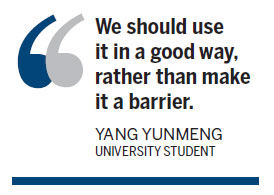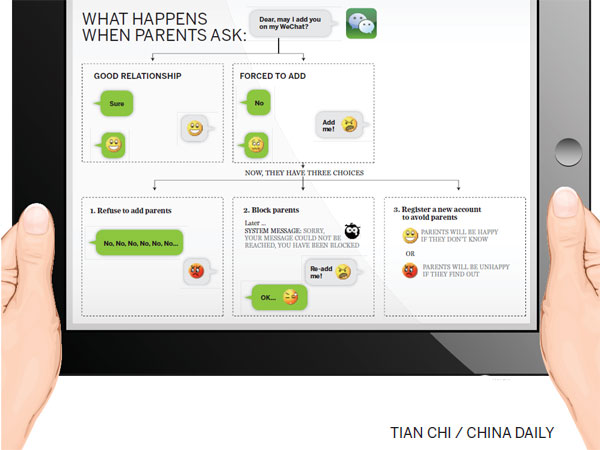Family networks
Updated: 2013-09-19 14:58
By Xu Lin (China Daily)
|
||||||||
Yang Yunmeng's mother fits that bill. The daughter says: "The street smarts are based on rumors. The health tips are unsubstantiated. And the uplifting stories are meaningless.
"As a Virgo with obsessive compulsive disorder, I don't know whether to laugh or cry at Mom's posts. I can't tell her these things don't make sense."
But Yang Yunmeng believes it's her mother's right to share what she wants online. She realizes most parents want their kids to see their posts.
While some parents secretly spy on their children using fake accounts, some children sneakily tamper with their parents' actual accounts.
Often, the children set up their parents' accounts in the first place, so they know their passwords - or at least how to get them.
Yuan, the 16-year-old, started his mothers' accounts, so he knows her passwords - and uses them without her knowledge.
"If she posts something embarrassing about me on her micro blog, I'll log on her account and delete it," he says.

Yuan says his classmate's mother followed her boy's micro blog. The boy believed it was a classmate who admired him, since the posts were encouraging.
When he discovered the truth, he changed his mother's password and told her hackers had hijacked the account.
Such bait-and-switch tactics are commonly used by the younger generation.
Shanxi province native Ning Cuiming secretly added her 17-year-old nephew's QQ and WeChat to see if he had a puppy love relationship that could affect his studies. Upon discovering this, the boy unfriended his 49-year-old aunt on WeChat gave his QQ account to Ning's daughter. Ning didn't know about the switch for some time, and her daughter didn't realize until later why the boy had given her his account.
Ning says: "I just noticed he blocked me on WeChat. I'm very angry because he must have an ulterior motive."
Her nephew Ning Shaogang tells China Daily he did it because he needs privacy. Understanding and trust are the bases of communication, he says.
Lu Dan'ni, a 32-year-old primary school teacher in Guangdong province's Shantou, says: "The older generation doesn't have an awareness of privacy. They even had to report their marriages and divorces to service organizations and companies in the old days. It's easy to understand their actions if you know about their backgrounds."
While there are many distinctively Chinese contours to familial SNS relationships, the existence of such relationships is an international phenomenon.
US website Onlineeducation.net's survey found 92 percent of American parents on Facebook are their children's friends on the site. Half the parents say they joined the site to keep tabs on their kids.
And one in three teens on Facebook feel embarrassed by comments left by their parents, the survey finds. Comparably, 30 percent say they would unfriend their parents if they could.
Also, globally speaking, monitoring their children isn't the only reason parents start SNS accounts. Many enjoy their own social media lives.
Lu, the teacher, helped her 60-year-old mother Xie Yanying open a WeChat account because her mom was curious about the new technology and knew relatives her age were using it. Xie says it's also a great way to get news.
And Xu, the editor, often uses her micro blog for work, to share experiences and views, and communicate with colleagues.
She has continued using her micro blog long after her son - her original reason for getting her accounts - blocked her.
The mother and her boy, instead, discuss experiences and thoughts face-to-face, and share with others online.
And, they agree, that's the way they like it.
Contact the writer at xulin@chinadaily.com.cn
Tiffany Tan, Liao Mei and Lin Shutong contributed to this story.

(China Daily USA 09/19/2013 page16)

 iPhone 5s, iPhone 5c hit Chinese market
iPhone 5s, iPhone 5c hit Chinese market
 China to play 'constructive' role on Syria: FM
China to play 'constructive' role on Syria: FM
 iPhone 5s, iPhone 5c hit Chinese market
iPhone 5s, iPhone 5c hit Chinese market
 Faces of Tibet
Faces of Tibet
 Full moon across China
Full moon across China
 Wearable technology, the new game-changer
Wearable technology, the new game-changer
 Tapestry of Chinese culture and a Harvard teen's feeling
Tapestry of Chinese culture and a Harvard teen's feeling
 A simple but pure festival tradition
A simple but pure festival tradition
Most Viewed
Editor's Picks

|

|

|

|

|

|
Today's Top News
UN lauds China on food waste efforts
Chinese firms face trust deficit
13 injured in Chicago park shooting
Wang and Kerry meet in DC
Belgian zoo owner set to host Chinese pandas
Trending news across China
Fast-track process sees more NGOs
Beijing sends out positive smoke signals
US Weekly

|

|





